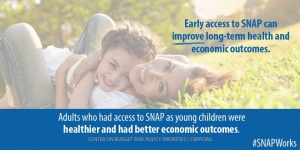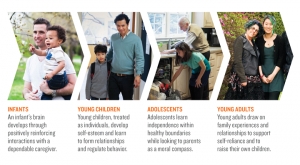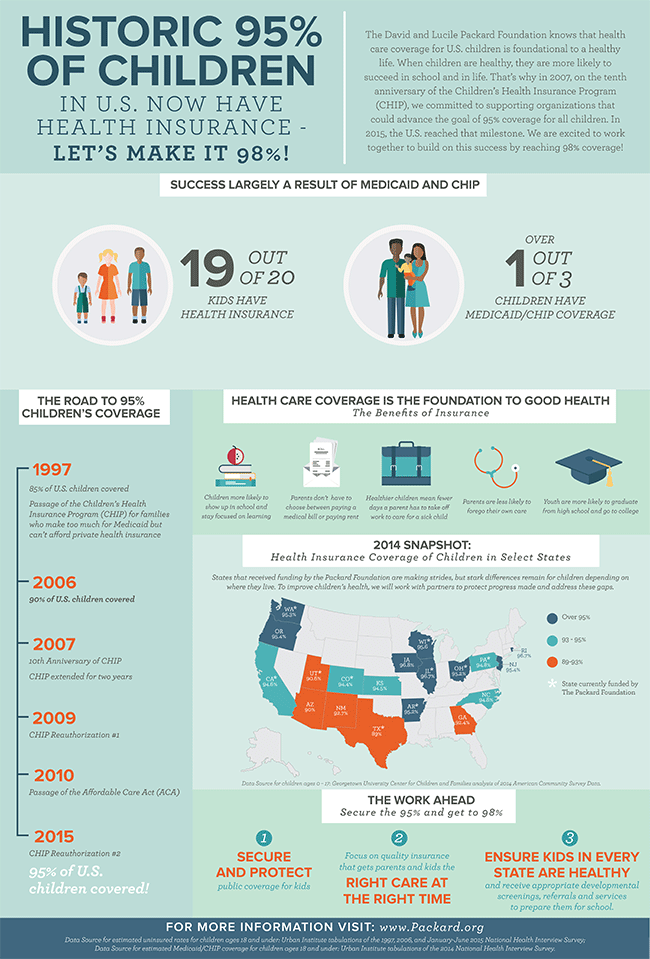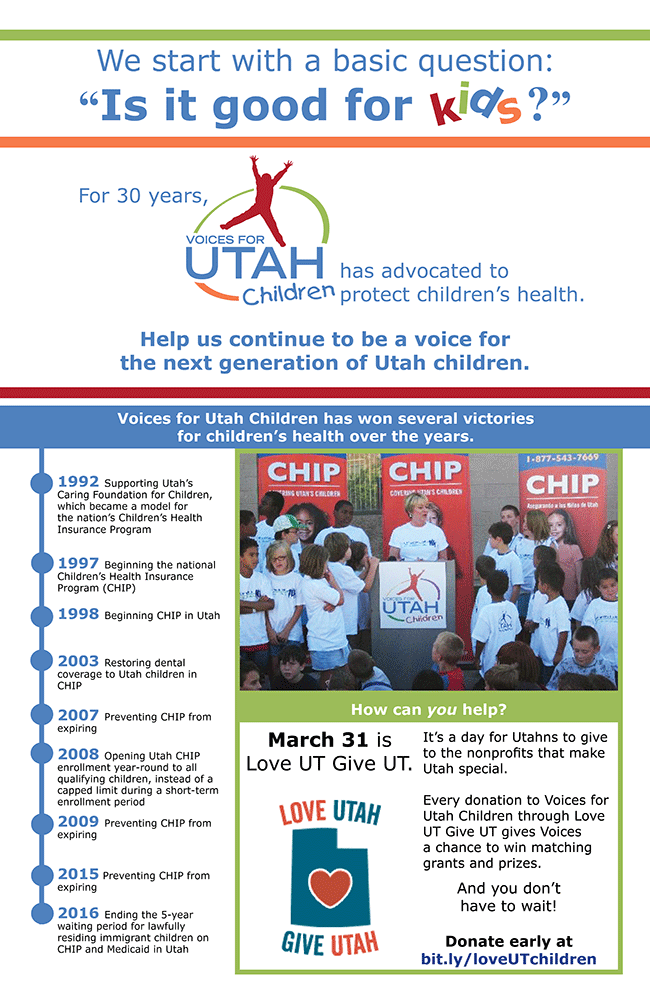Federal Policy
New Report Finds that #SNAPworks for Kids
A new report by the Center on Budget and Policy Priorities finds that the Supplemental Nutrition Assistance Program (SNAP) spends just $1.35 on average per person per meal for households with children, yet lifts millions of families and their children out of poverty. Here are some other key findings of the report:
- SNAP kept about 10.3 million people out of poverty in 2012, including about 4.9 million children.
- SNAP helps families put food on the table. Food insecurity — limited access to enough food for an active, healthy life — among children falls by roughly a third after their families receive SNAP benefits for six months.
- Some evidence suggests that children receiving SNAP are less likely than low-income non-participants to be in fair or poor health or underweight, and their families are less likely to trade off paying for health care and paying for other basic needs, like food, housing, heating, and electricity.
- Children who receive SNAP do better in school. SNAP participation can lead to improvements in reading and mathematics skills among elementary children, especially young girls, and increase the chances of graduating from high school.
- Adults who had access to SNAP as young children reported better health and had lower rates of “metabolic syndrome” (a combined measure of the incidence of obesity, high blood pressure, heart disease, and diabetes), and women who had access to food stamps as young children reported improved economic self-sufficiency (as measured by a combination of employment, income, poverty status, high school graduation, and program participation).
For more information, see the complete report:
SNAP Works for America’s Children
For 30 years now, Voices for Utah Children has called on our state, federal and local leaders to put children’s needs first. But the work is not done. The children of 30 years ago now have children of their own. Too many of these children are growing up in poverty, without access to healthcare or quality educational opportunities.
How can you be involved?
Make a tax-deductible donation to Voices for Utah Children—or join our Network with a monthly donation of $20 or more. Network membership includes complimentary admission to Network events with food, socializing, and opportunity to meet child advocacy experts. And don't forget to join our listserv to stay informed!
We look forward to the future of Voices for Utah Children and we hope you will be a part of our next 30 years.
Special thanks to American Express, our "Making a Difference All Year Long" sponsor. 
Using Data to Make a Difference
In the work that we do, it is imperative that we use data to inform our decisions and help children and their families access the resources they need. But with so many different tools and resources, it can be hard to find trusted information. That’s where the Data Center comes in. The Annie E. Casey Foundation’s KIDS COUNT Data Center contains thousands of child well-being indicators related to education, poverty, health and youth risk factors. By being able to filter by state, city, county and congressional district, users are able to access data that is relevant in their communities. Visit the Data Center today to enact change.
Here are some examples of the data tools you can find at the Kids Count Data Center.
Visit the Kids Count Data Center to find data you can share and embed on your own website!
For 30 years now, Voices for Utah Children has called on our state, federal and local leaders to put children’s needs first. But the work is not done. The children of 30 years ago now have children of their own. Too many of these children are growing up in poverty, without access to healthcare or quality educational opportunities.
How can you be involved?
Make a tax-deductible donation to Voices for Utah Children—or join our Network with a monthly donation of $20 or more. Network membership includes complimentary admission to Network events with food, socializing, and opportunity to meet child advocacy experts. And don't forget to join our listserv to stay informed!
We look forward to the future of Voices for Utah Children and we hope you will be a part of our next 30 years.
Special thanks to American Express, our "Making a Difference All Year Long" sponsor. 
How the EITC is Helping Utah Families Succeed
The Secret of Utah’s Success
The secret of Utah’s success has long been our strong, hardworking families. For many of these families, the secret of their success has been the financial boost they get when they file their taxes, thanks to the Earned Income Tax Credit (EITC).
 The EITC was created under President Gerald R. Ford in 1975 as a way to support low-wage workers and their children. Its success in promoting work, independence, and family self-sufficiency has made it a bipartisan favorite. In 1986, the EITC was expanded by President Ronald Reagan as part of his historic Tax Reform Act, and every president since has improved and expanded it further. The results have been remarkable. In-depth studies have documented the EITC’s effects on both parents and children:
The EITC was created under President Gerald R. Ford in 1975 as a way to support low-wage workers and their children. Its success in promoting work, independence, and family self-sufficiency has made it a bipartisan favorite. In 1986, the EITC was expanded by President Ronald Reagan as part of his historic Tax Reform Act, and every president since has improved and expanded it further. The results have been remarkable. In-depth studies have documented the EITC’s effects on both parents and children:
- increased employment and earnings
- reduced welfare dependency
- improved maternal and child health
- enhanced school performance, including high school graduation and college matriculation rates
The EITC’s success in helping families succeed has led 26 states to create their own versions of the EITC, and that number grows every year. State EITC legislation passed the Utah House of Representatives in 2013 and 2014, indicating how seriously Utah legislators are considering this proposal.
This booklet shares the stories of hardworking Utah families whose lives have been transformed by the EITC. About 200,000 Utah families receive the EITC every year, nearly 20% of all filers. These families include about 300,000 children. As you read their stories, imagine how many more families will see their lives improve and their children’s prospects expand once Utah creates our own state version of the Earned Income Tax Credit.
Sharing Their Stories
EITC Facts for Utah
 The federal Earned Income Tax Credit was created under President Ford and expanded by Presidents Reagan, Bush, and all subsequent presidents.
The federal Earned Income Tax Credit was created under President Ford and expanded by Presidents Reagan, Bush, and all subsequent presidents.
- 204,000 Utah households received the federal EITC during 2015 for Tax Year 2014, about one in five tax filers.
- Utah’s EITC households include about 200,000 workers and 300,000 children.
- The EITC brought about $471 million into Utah’s economy in 2014.
- Thousands of veterans and military families are helped, at a higher rate than the general population.
- Were it not for the EITC, 67,000 more Utahns would have fallen into poverty in 2014, including 35,000 children. This would have raised Utah’s overall poverty rate by about 2.4 percentage points—about a one-quarter increase. For children, the increase would have amounted to 3.9 percentage points or a 40% increase in child poverty.
View the Complete Printer-Friendly Report:
![]() Sharing Their Stories: How the EITC is Helping Utah Families Succeed
Sharing Their Stories: How the EITC is Helping Utah Families Succeed
For 30 years now, Voices for Utah Children has called on our state, federal and local leaders to put children’s needs first. But the work is not done. The children of 30 years ago now have children of their own. Too many of these children are growing up in poverty, without access to healthcare or quality educational opportunities.
How can you be involved?
Make a tax-deductible donation to Voices for Utah Children—or join our Network with a monthly donation of $20 or more. Network membership includes complimentary admission to Network events with food, socializing, and opportunity to meet child advocacy experts. And don't forget to join our listserv to stay informed!
We look forward to the future of Voices for Utah Children and we hope you will be a part of our next 30 years.
Special thanks to American Express, our "Making a Difference All Year Long" sponsor. 
Strategies to Address High Drug Prices
 Consumer representatives to the National Association of Insurance Commissioners, including Voices for Utah Children, released recommendations for policymakers to address the high prices that put medications out of reach for many families in need.
Consumer representatives to the National Association of Insurance Commissioners, including Voices for Utah Children, released recommendations for policymakers to address the high prices that put medications out of reach for many families in need.
Recommendations include:
- Limit the number of drug tiers that insurers can use;
- Limit consumer cost-sharing by, for instance, prohibiting coinsurance for prescription drugs;
- Adopt standardized plans with meaningful cost-sharing limits to mitigate adverse tiering;
- Prohibit mid-year formulary changes that negatively affect enrollee access to drugs;
- Require formularies to be updated weekly and include information about drug tiering, the actual dollar amount of any cost-sharing, any utilization management or network restrictions, and the process to request a drug exception, among other information;
- Collect standardized, plan-level data to enable the development of consumer tools and apps; and
- Solicit feedback from external stakeholders—such as advocates, other state agencies, ombudsmen, and independent medical experts—to inform the formulary review process.
For more information, see the complete report:
For 30 years now, Voices for Utah Children has called on our state, federal and local leaders to put children’s needs first. But the work is not done. The children of 30 years ago now have children of their own. Too many of these children are growing up in poverty, without access to healthcare or quality educational opportunities.
How can you be involved?
Make a tax-deductible donation to Voices for Utah Children—or join our Network with a monthly donation of $20 or more. Network membership includes complimentary admission to Network events with food, socializing, and opportunity to meet child advocacy experts. And don't forget to join our listserv to stay informed!
We look forward to the future of Voices for Utah Children and we hope you will be a part of our next 30 years.
Special thanks to American Express for sponsoring our 30th Anniversary Year. 
Senator Hatch Supports Bill to Protect Foster Children
Senator Orrin Hatch (R-UT) is working to pass the Family First Prevention Services Act (HR.5456/S.3065), a bipartisan bill that would ensure more children can stay safely with family and out of foster care by allowing federal child welfare dollars to be used on preventive mental health, substance abuse, and in-home counseling services to children who are candidates for foster care, as well as their parents or caregivers.
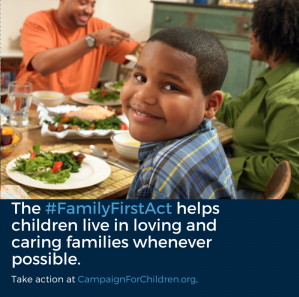 The bill also encourages the placement of children in foster care in the least restrictive, most family-like settings appropriate to their needs. This positive step would conform to the Annie E. Casey Foundation recommendations listed in a recently released report:
The bill also encourages the placement of children in foster care in the least restrictive, most family-like settings appropriate to their needs. This positive step would conform to the Annie E. Casey Foundation recommendations listed in a recently released report:
Kids Count Report: Too many children in child welfare are not living in families
“The Family First Prevention Services Act has the potential to have a far-reaching impact in the lives of foster children and youth and their families,” said Bruce Lesley, president of First Focus Campaign for Children. He commended Senator Hatch “for promoting evidence-based prevention services to keep children in family settings and out of foster care.”
Thank you, Senator Hatch, for your leadership on this issue!
For more information, see this fact sheet:
First Focus Fact Sheet: Family First Prevention Services Act
For 30 years now, Voices for Utah Children has called on our state, federal and local leaders to put children’s needs first. But the work is not done. The children of 30 years ago now have children of their own. Too many of these children are growing up in poverty, without access to healthcare or quality educational opportunities.
How can you be involved?
Make a tax-deductible donation to Voices for Utah Children—or join our Network with a monthly donation of $20 or more. Network membership includes complimentary admission to Network events with food, socializing, and opportunity to meet child advocacy experts. And don't forget to join our listserv to stay informed!
We look forward to the future of Voices for Utah Children and we hope you will be a part of our next 30 years.
Special thanks to American Express for sponsoring our 30th Anniversary Year. 
Helping Candidates Do Their Homework
2016 Candidate Briefing Guide
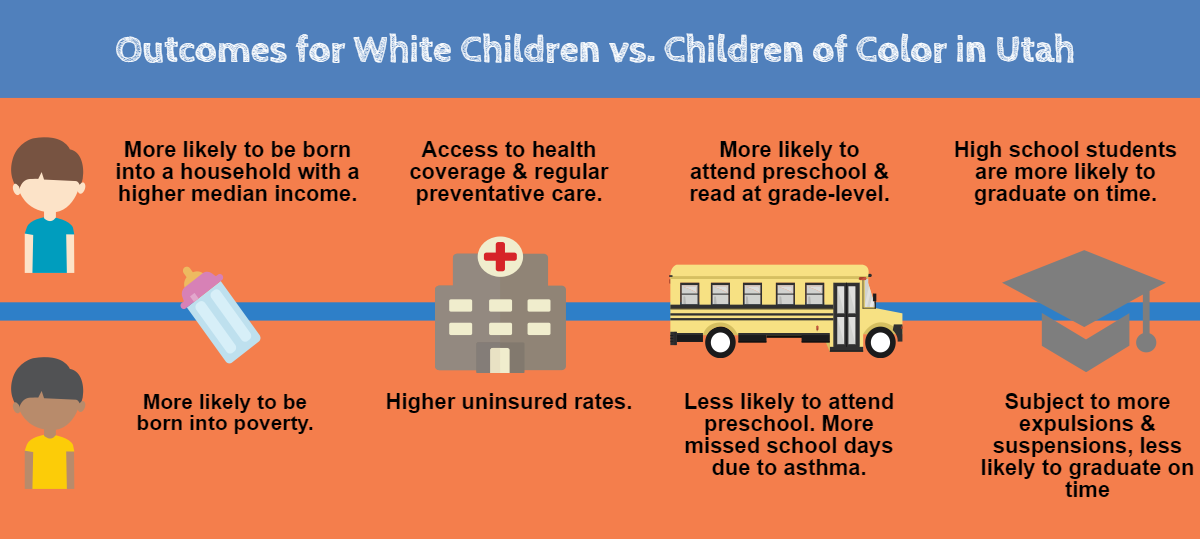
2016 is an important election year in Utah. The public offices on the ballot in November include the following:
- U.S. Senate
- U.S. House of Representatives
- Governor and Lt. Governor
- Half of the State Senate
- The entire Utah House of Representatives
Our elected officials play a central role in determining whether all children have the opportunity for health, safety, education, and economic security. As the Utah child population grows and becomes more diverse, it is important for candidates to discuss the needs of Utah children and the policies they would pursue to ensure that all Utah's children can thrive.
Voices for Utah Children is providing candidates for elected office in Utah with the resources in this Candidate Briefing Guide to help them understand the challenges facing Utah's children, direct public awareness and dialogue toward the needs of children over the course of their campaigns, and begin their terms of office prepared to enact effective policies to protect their youngest constituents.
Utah voters can also use these resources to educate ourselves about children’s issues as we seek to elect candidates that will prioritize the needs of children and invest in our state’s future.
More Information:
Racial and Ethnic Equity for Children in Utah: What we learned from the 2016 Legislative Session
Economic Security/Tax & Budget
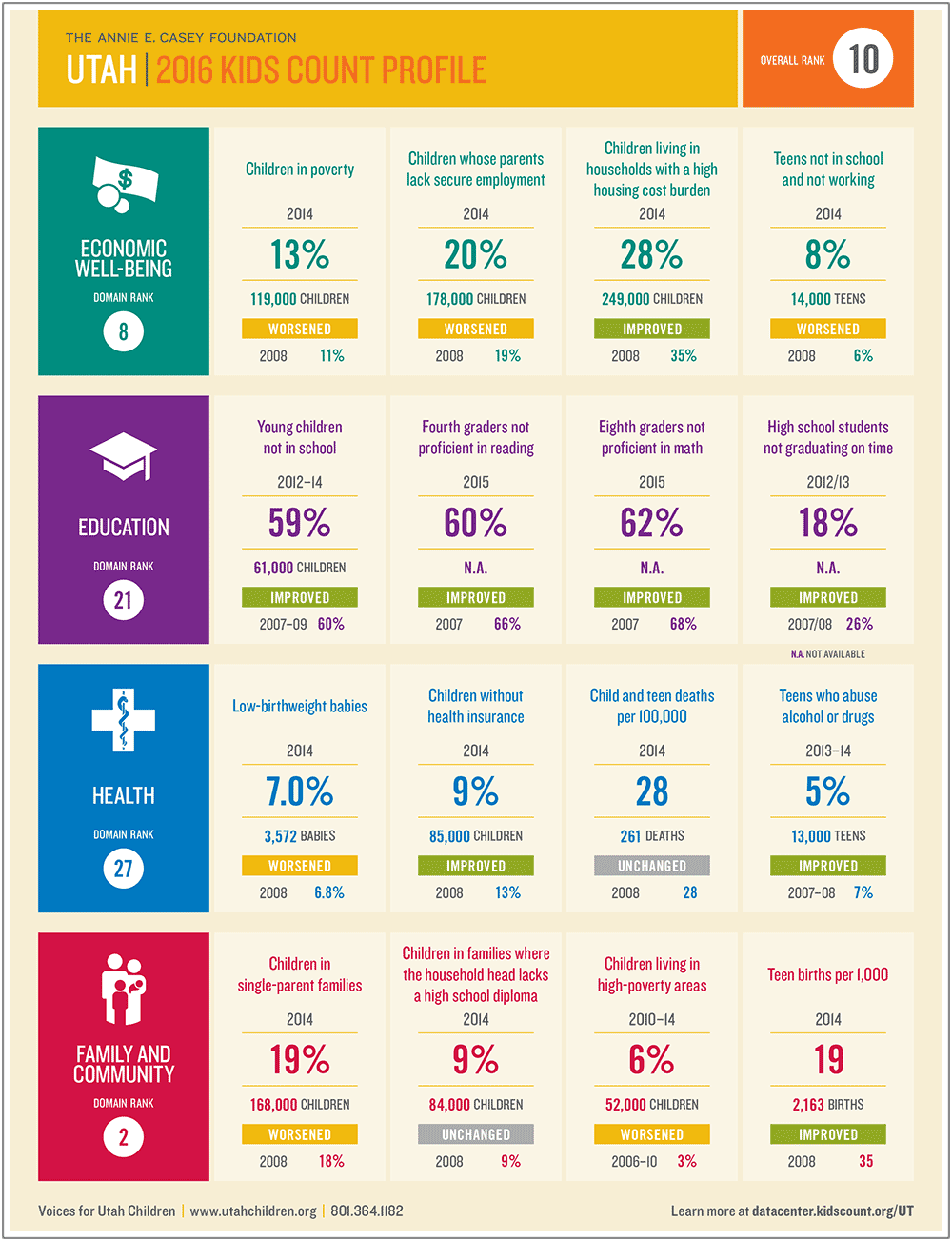 Supported by the Annie E. Casey Foundation, our KIDS COUNT® work aims to provide Utah’s legislators, public officials and child advocates with reliable data, policy recommendations and other tools needed to advance the kinds of sound policies that benefit children and families across the state.
Supported by the Annie E. Casey Foundation, our KIDS COUNT® work aims to provide Utah’s legislators, public officials and child advocates with reliable data, policy recommendations and other tools needed to advance the kinds of sound policies that benefit children and families across the state.
This year, Utah barely held on to its position among the top ten in the annual Annie E. Casey Foundation KIDS COUNT® Data Book report. Ranking 9th in 2015, Utah now ranks 10th among the fifty states (despite a dramatic change in the health domain, where Utah dropped from 7th in 2015 to 27th in 2016). Utah’s 2nd place ranking for the Family & Community domain and 8th place ranking for Economic Well-Being remained unchanged. In the Education domain, Utah ranked 21st — up from 29th in 2015.
Terry Haven 
Deputy Director
Voices for Utah Children
More Information:
Measures of Well-Being in Utah, 2015
![]() 2016 Utah and United States Kids Count Profiles
2016 Utah and United States Kids Count Profiles
The Federal Safety Net Cuts Child Poverty in Utah in Half
Each child brings the promise of a healthier, stronger future for Utah. To make good on that promise, Utah needs to make sure children can grow up healthy, from the prenatal period all the way through their teenage years.
Utah children and families should have access to:
- Appropriate prenatal care;
- Affordable, accessible, culturally competent care that encompasses both prevention and treatment; and
- Supportive services and environments designed to help facilitate the best possible health outcomes.
All families in Utah must be able to achieve optimal health in order for our state to continue to grow and prosper.
Jessie Mandle, MPH 
Health Policy Analyst
Voices for Utah Children
More Information:
12-Month Continuous Eligibility for Children on Medicaid
Utah's Uninsured Rate for Hispanic Children: Highest in the Country
A Coverage Gap Solution for Utah Families
Majority of Eligible Parents Who Would Benefit from Medicaid Expansion are Working
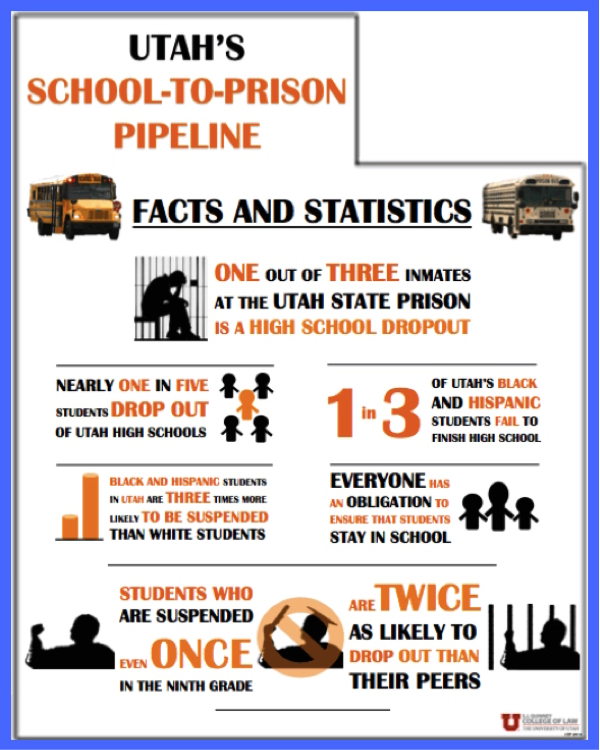 Voices for Utah Children seeks to reduce juvenile incarceration rates and eliminate the inappropriate use of secure confinement and out-of-home placement, ensuring that juvenile correction systems better protect youth and the public.
Voices for Utah Children seeks to reduce juvenile incarceration rates and eliminate the inappropriate use of secure confinement and out-of-home placement, ensuring that juvenile correction systems better protect youth and the public.
A key aspect of our juvenile justice work involves a commitment to challenging the School-to-Prison Pipeline, wherein children — particularly children of color and those with disabilities — are funneled out of public schools and into juvenile and criminal justice systems in a discriminatory application of discipline. “Zero-tolerance” policies criminalize minor infractions in the classroom, while the presence of law enforcement officers in schools often leads to student behavior being criminalized rather than handled within the school setting.
We are committed to the belief that children should be educated, not incarcerated. We work to empower advocates and community members alike, arming people with information that allows them take action to end School-to-Prison Pipeline.
Lincoln M. Nehring, JD 
President & CEO
Voices for Utah Children
The early years in a child’s life form the core foundation for later social, emotional and cognitive development. Done well, early childhood education can help level the playing field, especially for low-income children, by closing the access and achievement gaps, thereby enhancing not only school performance, but self-sufficiency over a lifetime.
At Voices for Utah Children, we focus on promoting targeted investments in early childhood education, with the goal of creating a statewide early learning system in Utah that supports all families by making sure they have access to high-quality options for their children’s early care and learning—whether children spend their days at home, in formal child care, or with family and friends.
Tess Davis, JD 
Policy Analyst
Voices for Utah Children
More Information:
Optional Extended-Day Kindergarten
5 Minute Guide to Shared Services
Economic Security/Tax & Budget
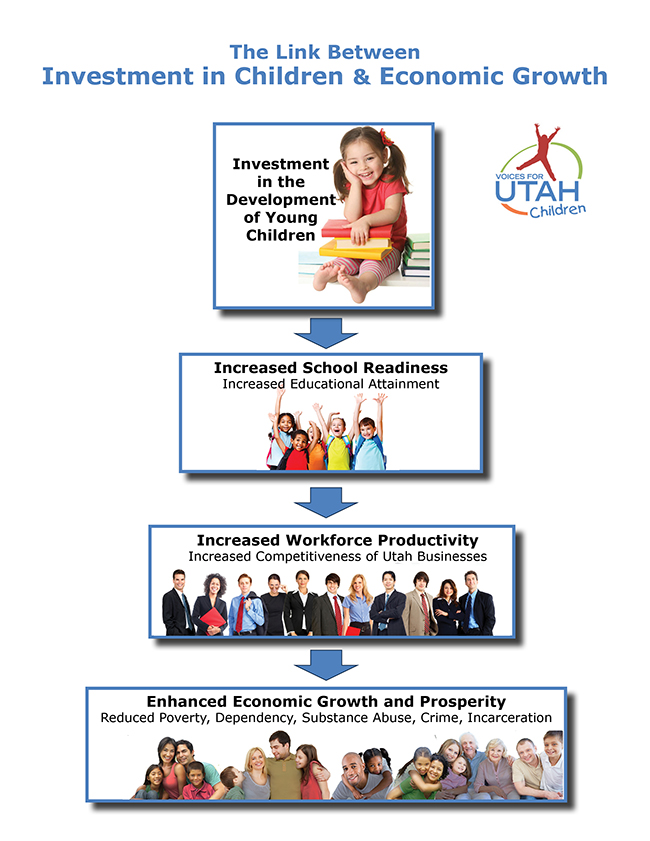
Every day, state governments raise and spend tax revenue in ways that profoundly affect families and communities. The fiscal choices Utah makes — about investing in schools, health care, child care, and other services — can help foster equal opportunity and lay the foundations for our future growth and prosperity.
Voices for Utah Children's fiscal policy program works to ensure that we invest sufficient resources in the vital public systems that ensure that our kids get world-class education and health care as well as special support for children most in need. We also work to ensure that public revenues are generated in ways that are fair; no family should be taxed into poverty as the price of educating their children.
Matthew Weinstein, MPP 
State Priorities Partnership Director
Voices for Utah Children
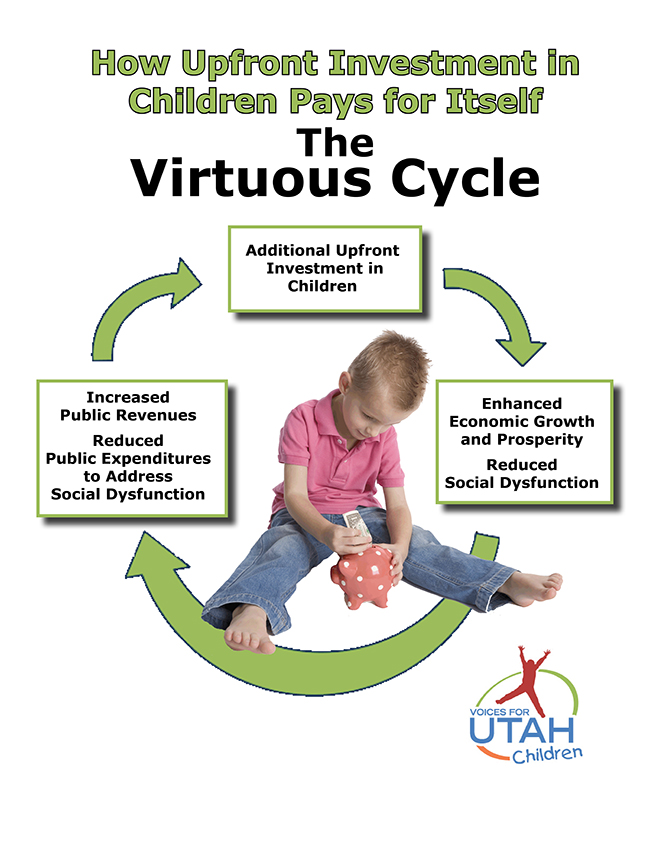
More Information:
Utah Children's Budget Report 2015
What's Still Eating Utah's General Fund?
Top 10 Reasons to End the Earmarks
Deseret News: Social service advocates call for lawmakers to 'end the earmarks'
Utah Policy.com: Poll: Utahns Split on Eliminating Transportation Earmarks
A Comparative Look at Utah and Colorado:
Part 1: Economic Opportunity
Part 2: Standard of Living
The Earned Income Tax Credit: A Time-Tested Two-Generation Strategy for Poverty
For 30 years now, Voices for Utah Children has called on our state, federal and local leaders to put children’s needs first. But the work is not done. The children of 30 years ago now have children of their own. Too many of these children are growing up in poverty, without access to healthcare or quality educational opportunities.
How can you be involved?
Make a tax-deductible donation to Voices for Utah Children—or join our Network with a monthly donation of $20 or more. Network membership includes complimentary admission to Network events with food, socializing, and opportunity to meet child advocacy experts. And don't forget to join our listserv to stay informed!
We look forward to the future of Voices for Utah Children and we hope you will be a part of our next 30 years.
Special thanks to American Express for sponsoring our 30th Anniversary Year. 
Mass Incarceration of Parents Hurts Kids
The latest Annie E. Casey Foundation report, A Shared Sentence: the devastating toll of parental incarceration on kids, families and communities, states that “the most powerful step, by far” to protect the children of parents in the justice system “is to reduce our nation’s overreliance on incarceration.” Having an incarcerated parent is a traumatic experience for a child with long-lasting health effects and often leads to poverty, which is also a threat to child well-being.
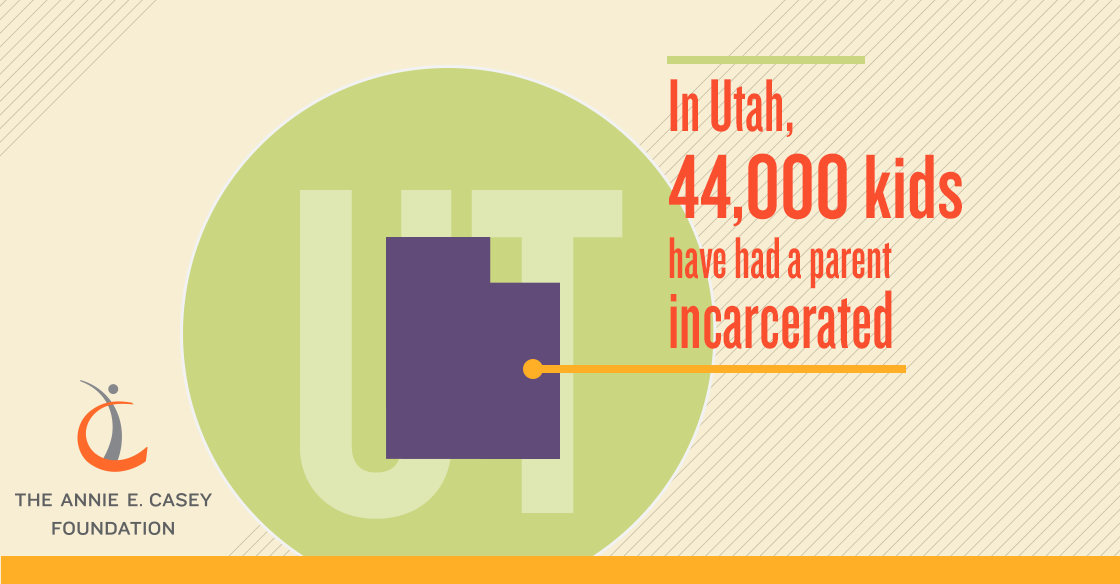 The report demonstrates that during the eighties and nineties, the number of kids with a father in prison or jail rose by 500%. Rising incarceration rates thwarted an opportunity to reduce the U.S. poverty rate by 20%; researchers point to increased incarceration as the factor that kept poverty rates from dropping.
The report demonstrates that during the eighties and nineties, the number of kids with a father in prison or jail rose by 500%. Rising incarceration rates thwarted an opportunity to reduce the U.S. poverty rate by 20%; researchers point to increased incarceration as the factor that kept poverty rates from dropping.
“While momentum for criminal justice reform continues to build, we know progress will take time. But we also know children can’t wait—nor can we as a nation afford to let them and their parents flounder, perpetuating poverty from one generation to the next.”
–Annie E. Casey Foundation
“There is no question that our country’s practice of mass incarceration is flawed, costly and in need of change,” states the report. The report lists several alternatives to overusing prisons and jails:
- Shorter sentences for nonviolent crimes (The majority of incarcerated persons are serving time for nonviolent offenses.)
- Alternative punishments to jail and prison for nonviolent offenders
- Not imprisoning people awaiting trial who can’t afford bail (People imprisoned while waiting for trial can lose their jobs, child care or homes even if they are absolved of wrongdoing.)
Another recent report released by the Sentencing Project, Fewer Prisoners, Less Crime: A Tale of Three States, profiled three states that dramatically reduced their prison populations in recent years and found that “during their period of decarceration, violent crime rates fell at a greater rate in these three states than they did nationwide.” The report concludes, “At least in three states we now know that the prison population can be reduced by about 25% with little or no adverse effect on public safety.”
Perhaps Utah should take a long look at states that are finding success in reducing the prison population. Do we also have an opportunity to improve outcomes for children and their families by reducing our prison population?
For 30 years now, Voices for Utah Children has called on our state, federal and local leaders to put children’s needs first. But the work is not done. The children of 30 years ago now have children of their own. Too many of these children are growing up in poverty, without access to healthcare or quality educational opportunities.
How can you be involved?
Make a tax-deductible donation to Voices for Utah Children—or join our Network with a monthly donation of $20 or more. Network membership includes complimentary admission to Network events with food, socializing, and opportunity to meet child advocacy experts. And don't forget to join our listserv to stay informed!
We look forward to the future of Voices for Utah Children and we hope you will be a part of our next 30 years.
Special thanks to American Express for sponsoring our 30th Anniversary Year. 
U.S.A. reaches goal of 95% health insurance coverage for children but Utah lags behind
In 2007, on the 10th anniversary of the Children’s Health Insurance Program (CHIP), the David and Lucile Packard Foundation and its partners committed to helping ensure that 95% of the nation’s children ages 0 to 18 had health insurance. This year the nation reached this historic goal, according to the Urban Institute’s report: Uninsurance among Children, 1997–2015 : Long-Term Trends and Recent Patterns. The success of CHIP and the expansion of Medicaid in many states were critical for reaching these historic numbers for health insurance coverage.
However, Utah lags the nation, with only 90.6% of Utah children insured. In fact, Utah ranks among the bottom of all states for children’s health insurance coverage and Utah Hispanic children are particularly unlikely to have health insurance. Nationwide, 9.7% of Hispanic children are uninsured but 23.4% of Utah Hispanic children are uninsured.
Children with access to quality, comprehensive health coverage are more likely to attend school and stay focused on learning. Healthier children means parents take fewer days off work to care for a sick child. It also means parents don’t have to choose between paying a medical bill or paying rent.
How can we get more Utah kids covered?
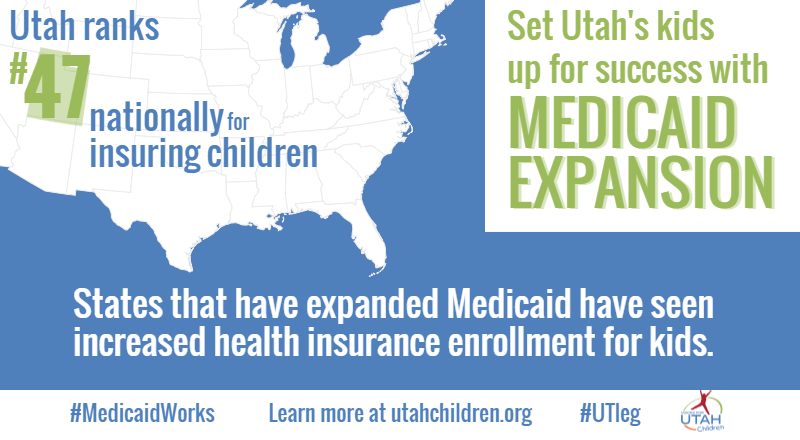 Follow through with the work begun at the 2016 Legislature. During the recent session, Utah lawmakers added intent language to end the 5-year wait for lawfully residing immigrant children, agreed to study options to improve enrollment in Medicaid, and allocated funding to Medicaid and CHIP outreach for the first time in years. Let’s finish what we started.
Follow through with the work begun at the 2016 Legislature. During the recent session, Utah lawmakers added intent language to end the 5-year wait for lawfully residing immigrant children, agreed to study options to improve enrollment in Medicaid, and allocated funding to Medicaid and CHIP outreach for the first time in years. Let’s finish what we started.- Cover the gap. States that fully expanded Medicaid saw more improvement in children’s health insurance coverage than states like Utah. Utah lawmakers chose to leave money on the table in Washington rather than fully cover the gap. Expanding Medicaid would help Utah address Utah’s low enrollment of eligible children in Medicaid and CHIP, as newly eligible adults enroll their whole families.
- Extend CHIP. CHIP funding is scheduled to end in 2017 despite its overwhelming success.
Now that the goal of getting 95% of children insured has been met nationally, the Packard Foundation has announced a new commitment to reach 98% coverage for our nation’s children. By the time the nation meets this new goal, we hope to be able to say that Utah kids are just as likely to be insured as children across the nation. Let’s catch up now.
For 30 years now, Voices for Utah Children has called on our state, federal and local leaders to put children’s needs first. But the work is not done. The children of 30 years ago now have children of their own. Too many of these children are growing up in poverty, without access to healthcare or quality educational opportunities.
How can you be involved?
Make a tax-deductible donation to Voices for Utah Children—or join our Network with a monthly donation of $20 or more. Network membership includes complimentary admission to Network events with food, socializing, and opportunity to meet child advocacy experts. And don't forget to join our listserv to stay informed!
We look forward to the future of Voices for Utah Children and we hope you will be a part of our next 30 years.
Special thanks to American Express for sponsoring our 30th Anniversary Year. 
Love UT Give UT is Thursday, March 31 and we need your help!
Donate Now
 Public policies affect children—but children don’t vote. At Voices for Utah Children, we raise our voices on behalf of children, informing policymakers that government can and should act to keep kids safe and help them succeed.
Public policies affect children—but children don’t vote. At Voices for Utah Children, we raise our voices on behalf of children, informing policymakers that government can and should act to keep kids safe and help them succeed.
Voices for Utah Children actively seeks grant money from children’s foundations to support our research and educational efforts, but most grant funding cannot be used for lobbying. Voices for Utah Children needs donations from community members to fund staff time at Capitol Hill—where we put our knowledge about children into action by supporting legislation that protects and invests in children.
Your support was crucial to the successful legislative session we just completed. Because of your donations, Voices for Utah Children won important victories benefiting Utah children and families:
- Additional money for quality preschool for 4,000 children;
- Removal of the 5-year waiting period for legal immigrant children to help 1,000 children enroll in CHIP and Medicaid;
- Expanded Medicaid coverage to 3,800 parents in poverty;
- The first CHIP and Medicaid outreach funding since 2007 to support the Department of Health’s efforts to reach and enroll eligible Hispanic families.
Utah’s statewide day of giving is Love UT Give UT on March 31. Your tax-deductible donation to Voices for Utah Children goes even further during the Love UT Give UT campaign. Generous donors may match your donation and if Voices for Utah Children is among the Utah charities that receive the most donations of at least $10 each from different individual supporters, we could win up to $10,000 to support our mission.
In this video, a Utah child explains some of the victories Voices for Utah Children has won for Utah kids. Help us keep speaking out for the next generation of Utah kids. Donate by March 31 to Voices for Utah Children through Love UT Give UT at http://bit.ly/loveUTchildren
Video: A 10-year-old explains why you should support Voices for Utah Children
Donate Now
 March 31, 2016 is Love UT Give UT!
March 31, 2016 is Love UT Give UT!
It’s a day for Utahns to give to the nonprofits that make Utah special. Every donation to Voices for Utah Children through Love UT Give UT gives Voices a chance to win matching grants and prizes.
And you don't have to wait! Donate now at http://bit.ly/loveUTchildren.
For 30 years now, Voices for Utah Children has called on our state, federal and local leaders to put children’s needs first. But the work is not done. The children of 30 years ago now have children of their own. Too many of these children are growing up in poverty, without access to healthcare or quality educational opportunities.
How can you be involved?
Make a tax-deductible donation to Voices for Utah Children—or join our Network with a monthly donation of $20 or more. Network membership includes complimentary admission to Network events with food, socializing, and opportunity to meet child advocacy experts. And don't forget to join our listserv to stay informed!
We look forward to the future of Voices for Utah Children and we hope you will be a part of our next 30 years.
Special thanks to American Express for sponsoring our 30th Anniversary Year. 
Help us keep protecting children's health with #loveUTgiveUT
 March 31, 2016 is Love UT Give UT!
March 31, 2016 is Love UT Give UT!
It’s a day for Utahns to give to the nonprofits that make Utah special. Every donation to Voices for Utah Children through Love UT Give UT gives Voices a chance to win matching grants and prizes.
And you don't have to wait! Donate now at http://bit.ly/loveUTchildren.
For 30 years now, Voices for Utah Children has called on our state, federal and local leaders to put children’s needs first. But the work is not done. The children of 30 years ago now have children of their own. Too many of these children are growing up in poverty, without access to healthcare or quality educational opportunities.
How can you be involved?
Make a tax-deductible donation to Voices for Utah Children—or join our Network with a monthly donation of $20 or more. Network membership includes complimentary admission to Network events with food, socializing, and opportunity to meet child advocacy experts. And don't forget to join our listserv to stay informed!
We look forward to the future of Voices for Utah Children and we hope you will be a part of our next 30 years.
Special thanks to American Express for sponsoring our 30th Anniversary Year. 

